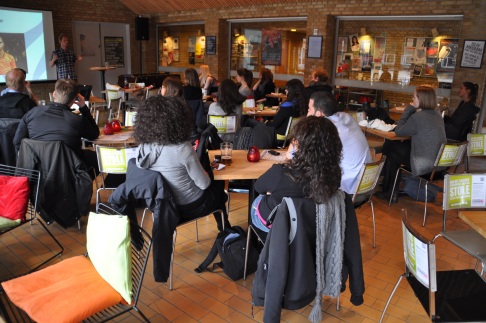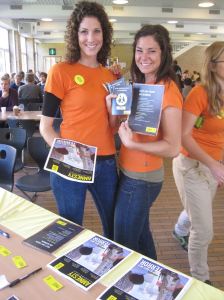Amnesty Denmark’s campaign Manager Jakob Silas Lund talks at the AIAU info evening about Amnesty’s Arms Trade Treaty campaign.
On Wednesday, 11 April 2012, AIAU organized an info evening regarding Amnesty Denmark’s Arms Trade Treaty campaign. The event took place at Studenterhus Café and AIAU invited Aarhus University students and all others interested to a talk about Amnesty’s work and endeavors regarding the campaign given by Amnesty Denmark’s campaign manager Jakob Silas Lund.
After a welcome and an introduction to the evening and the issue by Christoph Zimdahl, campaign manager Jakob Silas Lund elaborated on the problems of the uncontrolled spread of arms and the challenges that the agreement on an international arms trade control faces:
Every minute the use of weapons causes the loss of one human life. Every day weapons are used to suppress and engage in violence against people in different parts of the world. Yet today there are stricter rules for trade in bananas and cucumbers than for an international arms trade.
War crimes, unlawful killings, torture, rapes and other serious human rights abuses have been committed around the world using a wide range of weapons, munitions and military and security equipment. These are often provided to perpetrators in almost unlimited supply, encouraging and prolonging unlawful violence.
For this reason, Amnesty International spent both spring and summer 2012 working on putting this problem on the international agenda and getting the UN to agree upon an arms treaty.
During the evening participants had the opportunity to engage in a discussion, sign the Amnesty petition regarding the Arms Trade Treaty and urge politicians from different countries to promote the development of a more regulated arms trade worldwide.
After the talk and the discussion, many interested students were able to attend a movie screening of a political documentary on the uncontrolled widespread of small arms, which rule and ruin the lives of a growing number of people in developing countries. The film ‘Dealing and Wheeling in Small Arms’ was part of the Amnesty Arms Trade Treaty campaign.
For the trailer of the film click here: http://www.youtube.com/watch?v=e0Ei49NDNcs.
More info about the Amnesty campaign: http://www.amnesty.org/en/campaigns/control-arms
AIAU Student Group


 AIAU was represented at the Amnesty Denmark meeting for local groups and associations the 5th of November 2011.
The purpose of the meeting was to exchange ideas, discuss the structure of Amnesty in Denmark and to hear news from the Danish committee.
AIAU was represented at the Amnesty Denmark meeting for local groups and associations the 5th of November 2011.
The purpose of the meeting was to exchange ideas, discuss the structure of Amnesty in Denmark and to hear news from the Danish committee.
